Tinnitus (Ringing in the Ears)
Tinnitus is the perception of sound in the ear or head without an external sound source, and this condition can negatively affect a person’s quality of life.
Take the First Step Now
For more information, contact us
Schedule your appointment or online consultation with Prof. Dr. Mustafa Deniz Yılmaz now. Take the first step in your treatment process and let’s begin your journey to recovery together with personalized solutions.
What is Tinnitus?
Tinnitus is a condition where a person perceives sounds in their ears or head without any external sound source. This sound can take various forms, such as ringing, buzzing, humming, whistling, hissing, or bell sounds. Tinnitus may be continuous or intermittent and can occur in one or both ears. Tinnitus is not a disease in itself but is usually a symptom of an underlying health issue. This condition may be temporary or become chronic, impacting quality of life. Tinnitus can arise from numerous causes, and treatment typically depends on identifying the underlying cause.
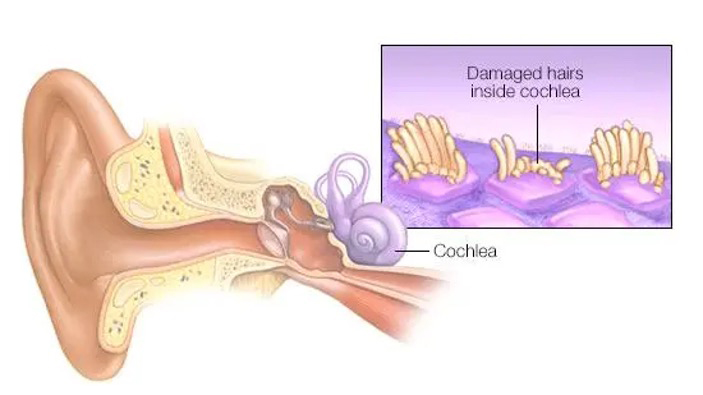
What Causes Tinnitus?
Tinnitus can result from various factors, and underlying causes may vary from person to person. Here are some common causes of tinnitus:
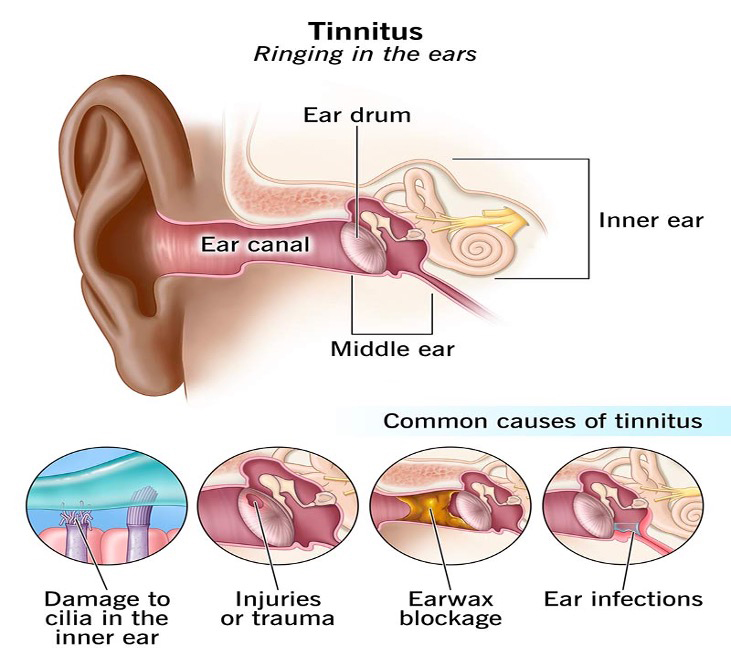
Hearing Loss
Age-Related Hearing Loss (Presbycusis): With aging, damage to the auditory nerves can lead to tinnitus.
Noise-Induced Hearing Loss: Prolonged exposure to loud sounds or sudden loud noises can damage hearing cells and cause tinnitus.
Ear-Related Problems
Earwax Buildup: Excessive earwax can block the ear canal and lead to tinnitus.
Middle Ear Infections: Infections or fluid buildup in the middle ear can cause temporary or permanent tinnitus.
Eardrum Perforation: Damage or perforation of the eardrum may cause tinnitus.
Inner Ear Problems
Meniere’s Disease: Characterized by fluid buildup in the inner ear, this condition can cause tinnitus, dizziness, and hearing loss.
Otosclerosis: Abnormal bone growth in the middle ear can lead to hearing loss and tinnitus.
Medications
Ototoxic Medications: Some medications (e.g., certain antibiotics, diuretics, aspirin, chemotherapy drugs) can damage the ears, causing tinnitus.
Head and Neck Injuries
Trauma: Injuries to the head or neck can damage auditory pathways or hearing centers in the brain, leading to tinnitus.
Circulatory System Disorders
High Blood Pressure: Hypertension and atherosclerosis can cause abnormal blood flow in blood vessels, leading to tinnitus.
Vascular Obstruction: Blockages or narrowing in blood vessels can cause pulsatile (pulse-like) tinnitus.
Temporomandibular Joint (TMJ) Disorders
Jaw joint issues, due to their proximity to the ear, may cause tinnitus.
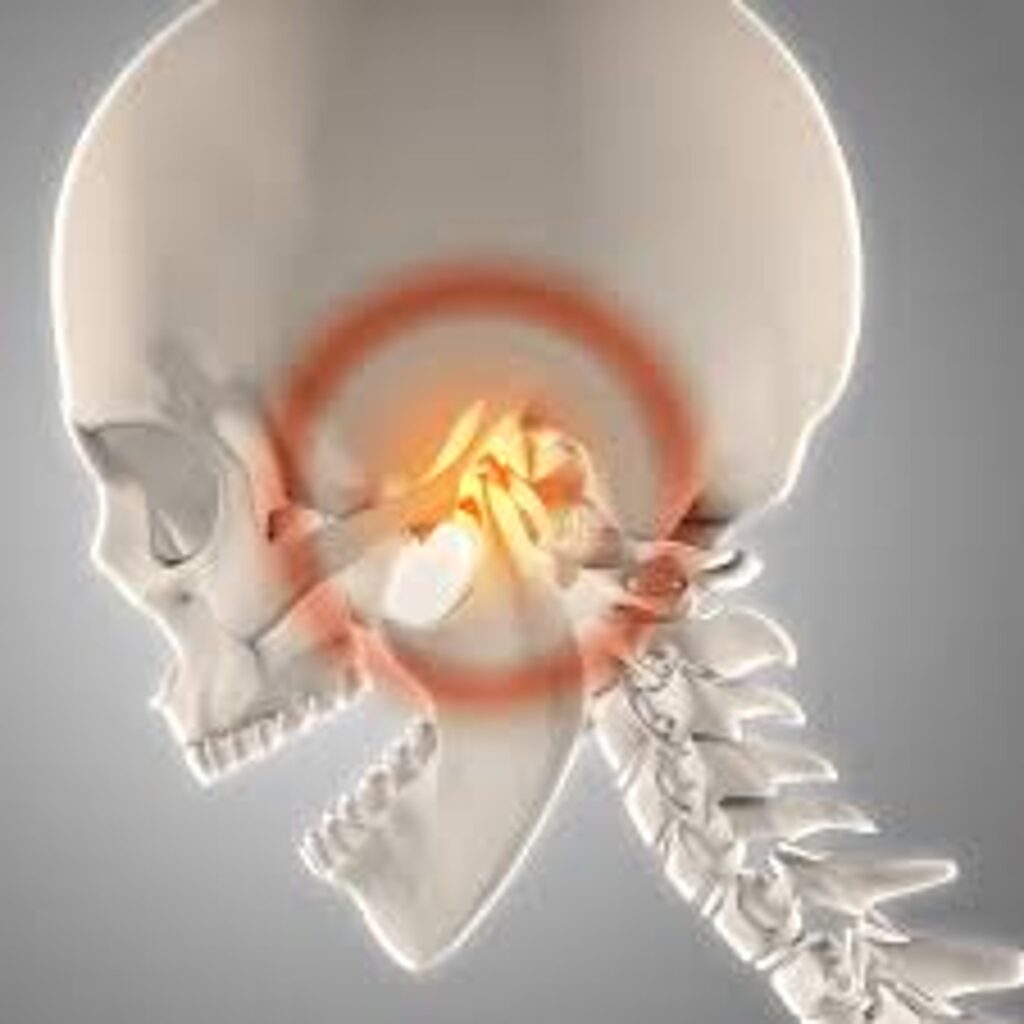
Stress and Anxiety
Stress and anxiety can trigger tinnitus or make existing tinnitus more bothersome.
Other Neurological Conditions
Multiple Sclerosis (MS): Neurological diseases like MS can affect auditory pathways, causing tinnitus.
Other Causes
Caffeine or Alcohol Use: These substances can exacerbate tinnitus.
Weight Loss and Dietary Changes: Sudden weight loss or extreme diets may trigger tinnitus in some individuals.
The cause of tinnitus is not always identifiable, but understanding the underlying causes can help guide a treatment plan. If you experience tinnitus, consulting an Ear, Nose, and Throat (ENT) specialist is essential.
Is Tinnitus Permanent?
Tinnitus may be temporary and resolve on its own in some people. However, in certain cases, tinnitus becomes chronic and permanent, often as a result of an underlying health issue.
How is Tinnitus Diagnosed?
Diagnosis of tinnitus typically begins with an assessment of the patient’s symptoms. ENT examination, hearing tests (audiometry), and sometimes imaging tests (such as MRI or CT scans) can be used. Blood tests may also be conducted.
Tests Used in Tinnitus Evaluation
In tinnitus assessment, various audiometric tests are used to determine the characteristics of the hearing loss and tinnitus. These tests help in identifying the type, severity, and impact of tinnitus on the individual’s hearing ability. Here are the main audiometric tests used in tinnitus evaluation:
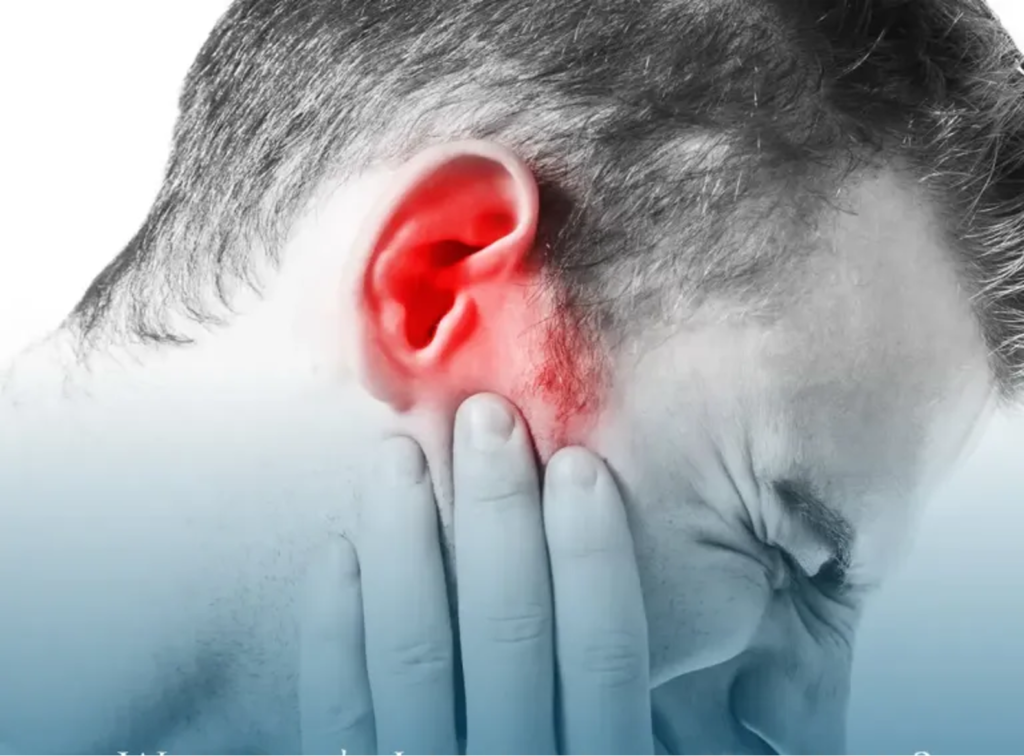
1. Pure Tone Audiometry
Purpose: To determine the degree and type of hearing loss.
Procedure: The patient indicates whether they hear tones at different frequencies through headphones.
Assessment: Most tinnitus patients may have hearing loss at specific frequencies. Pure tone audiometry maps this loss.
2. Tinnitus Matching Test
Purpose: To identify the frequency and intensity of the tinnitus.
Procedure: Patients are presented with tones at various frequencies and loudness levels to match the sound closest to their tinnitus.
Assessment: The frequency and intensity of the tinnitus are determined based on the patient’s description, aiding in objective evaluation and treatment planning.
3. Tinnitus Masking Test
Purpose: To determine the masking level of the tinnitus.
Procedure: Sounds at specific frequencies and intensities are presented to see when the tinnitus becomes inaudible.
Assessment: Determining the masking level provides insights into the severity and management of tinnitus and helps evaluate the effectiveness of masking treatment.
4. Tinnitus Handicap Inventory (THI)
Purpose: To assess the impact of tinnitus on the patient’s quality of life.
Procedure: Patients answer questions regarding how tinnitus affects their daily life.
Assessment: THI scores indicate the extent to which tinnitus affects the patient’s social, emotional, and functional state, guiding the treatment plan.
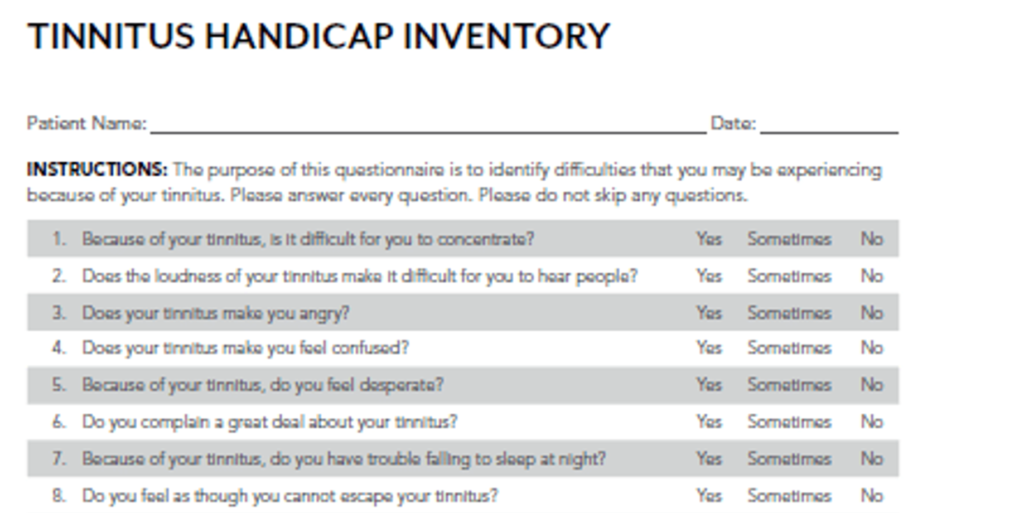
5. Loudness Discomfort Level (LDL) Test
Purpose: To determine sound levels that cause discomfort in the patient.
Procedure: Patients are presented with sounds at various intensities to identify the discomfort threshold.
Assessment: LDL results aid in planning sound therapy for patients with sound sensitivity (hyperacusis).
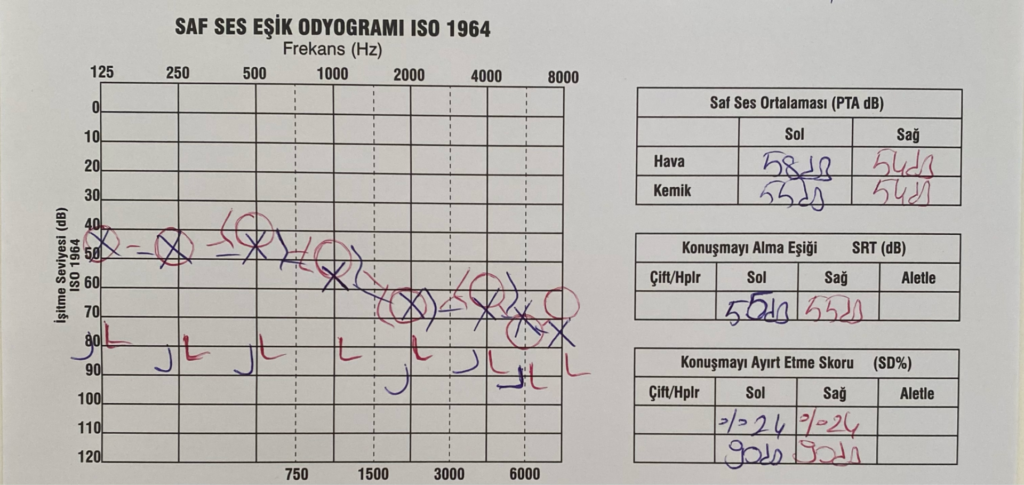
6. Speech Audiometry
Purpose: To evaluate how clearly the patient hears and understands speech.
Procedure: The patient repeats various words or sentences.
Assessment: In addition to hearing loss, tinnitus patients may experience difficulty understanding speech, which this test assesses.
These tests are used together to determine the causes, type, and severity of tinnitus. Tinnitus evaluation is crucial for accurate diagnosis and effective treatment planning.
Is Tinnitus Treatable?
Treatments for tinnitus include Tinnitus Retraining Therapy (TRT), rehabilitation with hearing aids, tinnitus maskers, cognitive behavioral therapy (CBT), stress management, medication, and sound therapy. Treatment may vary depending on the underlying cause.
Does Tinnitus Cause Hearing Loss?
Tinnitus does not typically cause hearing loss, but it is more common in people with hearing loss. Tinnitus and hearing loss can develop independently or occur together in some cases.
Which Medications are Known to Cause Tinnitus?
Some medications may contribute to the onset of tinnitus. These include certain antibiotics, diuretics, high doses of aspirin, some antidepressants, and chemotherapy drugs. These are known as ototoxic drugs and can damage the ear.
Can Tinnitus Be Related to Stress?
Yes, stress can worsen or trigger tinnitus symptoms. Increased stress may make tinnitus more noticeable. Moreover, stressful situations and anxiety may heighten awareness of tinnitus.
Can Tinnitus Go Away on Its Own?
In some cases, tinnitus can resolve on its own, especially if a temporary cause is involved (e.g., exposure to loud noise or a temporary ear infection). However, chronic tinnitus often does not go away on its own and may require medical assistance to manage symptoms.
What Can Be Done to Cope with Tinnitus?
Various methods exist to cope with tinnitus, including reducing stress, improving sleep hygiene, avoiding noisy environments, adopting a healthy lifestyle, practicing yoga and meditation, using hearing aids, and participating in Tinnitus Retraining Therapy (TRT) or cognitive behavioral therapy (CBT).
Which Specialists Treat Tinnitus?
Tinnitus treatment is usually managed by Ear, Nose, and Throat (ENT) specialists. Audiologists (hearing specialists) and, in some cases, psychologists or psychiatrists may also be involved in the treatment process.
Can Tinnitus Result from Ear Infections?
Yes, ear infections are a common cause of tinnitus. Infections can lead to inflammation and fluid buildup in the ear canal or inner ear, resulting in a ringing sensation in the ear.
How Can Tinnitus Progression be Prevented?
To prevent the progression of tinnitus, avoid loud noises, use hearing protection, maintain ear hygiene, lead a healthy lifestyle, practice stress management, and avoid ototoxic medications if possible.
Can Tinnitus Develop Suddenly?
Yes, tinnitus can develop suddenly due to factors like loud noise exposure, ear injury, sudden hearing loss, or an infection. Consulting a doctor is essential in cases of sudden-onset tinnitus.
Tinnitus can manifest differently among individuals, and treatment varies from person to person. If you experience tinnitus, consulting an ENT doctor can help you manage your symptoms and improve your quality of life.
Tinnitus Retraining Therapy (TRT)
Tinnitus, commonly known as “ringing in the ears,” is the perception of sounds like ringing, buzzing, humming, or rustling in the ear or head without an external sound source. Tinnitus can be bothersome for many people, appearing in various intensities and durations, affecting quality of life. One of the methods developed to manage this condition is known as **Tinnitus Retraining Therapy (TRT)**.
What is Tinnitus Retraining Therapy (TRT)?

TRT is a treatment method developed in the 1980s by neurophysiologist Dr. Pawel Jastreboff, aimed at reducing the discomfort and stress caused by tinnitus. TRT focuses on changing how tinnitus is perceived and the emotional response to it. This therapy is based on theories about how tinnitus is processed in the brain and aims to help the brain adapt to the tinnitus sound.
Core Components of TRT
Tinnitus Retraining Therapy consists of two main components:
- Sound Therapy: This component involves using a low-level, continuous sound to reduce the brain’s perception of tinnitus. The goal is not to eliminate the tinnitus sound but to make it less bothersome. The sounds used in sound therapy are set at a level the patient can comfortably hear and help the brain gradually become desensitized to the tinnitus sound over time.
- Counseling: This component of TRT involves providing information about tinnitus and altering the individual’s perception of it. During counseling, it is explained that tinnitus is harmless and does not pose a threat. This process helps the patient stop perceiving the tinnitus sound as threatening, reducing the emotional response to it. Counseling also supports the patient in developing personal strategies to improve quality of life and reduce stress.
How is TRT Applied?
TRT is usually administered individually by a specialist, with a treatment plan tailored to the individual. The treatment typically lasts several months to a year and includes regular follow-up sessions. Here are the general stages of the TRT process:

- Assessment: The initial step involves evaluating factors such as the severity of the tinnitus, situations in which it worsens, and whether there is any hearing loss. This assessment guides how TRT will be applied.
- Counseling: Detailed information about tinnitus is provided to the patient, including how to reduce the discomfort it causes and information on the treatment process.
- Sound Therapy: A personalized sound therapy plan is developed. Sound therapy is used continuously to help the patient become accustomed to the tinnitus sound and desensitized to it.
- Follow-Up Sessions: Regular follow-up sessions are held during the treatment process to monitor the patient, make necessary adjustments to the treatment plan, and provide additional support.
Effectiveness and Advantages of TRT
TRT is recognized as an effective method for reducing the discomfort caused by tinnitus. However, the effectiveness of the treatment can vary from person to person, and it does not guarantee the complete elimination of the tinnitus sound. Nonetheless, many patients are better able to cope with tinnitus and experience a significant improvement in their quality of life through TRT.
Advantages:
- Provides a personalized approach to coping with tinnitus.
- Can help reduce stress and improve quality of life.
- Desensitizes the patient to the tinnitus sound, reducing discomfort.
Disadvantages:
- The treatment duration can be lengthy (months or even years).
- Complete recovery is not guaranteed, and there is no certainty that the tinnitus sound will completely disappear.
Conclusion
Tinnitus Retraining Therapy (TRT) is considered an effective approach to managing tinnitus, providing a personalized treatment strategy. Combining sound therapy and counseling, TRT aims to alter how tinnitus is perceived and the emotional response to it. In the long term, TRT can reduce the discomfort caused by tinnitus, allowing patients to experience significant improvements in their quality of life.
To learn more about TRT or start the treatment process, it is essential to consult a specialist. Experts can develop a treatment plan tailored to individual needs, guiding patients on managing tinnitus.
My paths crossed with Dr. Deniz because of my vocal cord polyp. My indecision before my doctor cost me 8 months. It didn't take us 8 minutes to get examined and decide on surgery. I pray for you for restoring my hoarse voice. I'm so glad Mustafa Deniz Yılmaz🙏
My nephew Ugur Karaer was suffering from empty nose syndrome. We went to every doctor in Istanbul. Finally, God brought us to Dr. Deniz. He performed the surgery successfully and saved my nephew's life. May God bless him.
I don't know how many surgeries I've had myself. But when it comes to children, everything calms down. 🙁 After seeing three doctors for my 2.5-year-old daughter's adenoid and tonsillectomy, we thankfully found Prof. Dr. Mustafa Deniz Yılmaz. His knowledge and patient approach made us believe he was by far the best doctor in this field. His assistant, secretary, the specialist who performed the hearing test... the entire team was extremely professional. Success is a team effort. That's why the whole process went smoothly, and we left satisfied. 💕 May God bless him 🙏🏻
We came from Almaty on vacation, and my son started having ear pain from the very first day. They recommended drops and medications, but nothing helped. We stumbled across a doctor online and decided to take a chance. She turned out to be wonderful, and after the first dose of medication, my son felt better. Within a week, there was no trace of the infection. Special thanks to the translator for her care, understanding, and professionalism.
I was suffering from empty nose syndrome. For those who don't know, I should say that almost all of my nasal tissue was removed. It is a very bad disease. I went to 100 ENT doctors in Istanbul and they couldn't find a solution. Finally, I found Deniz Hoca, who is an expert in this field, and he took cartilage from my rib and performed the surgery and I got better. Thank you very much for everything.
I had a tonsillectomy performed by our doctor, Mustafa Deniz Yılmaz. The surgery went smoothly, and although it's said to be more difficult for adults, I recovered very quickly. I'm so glad I chose Mustafa.
Hello, they told me that my parotid gland needed to be removed. I went to so many doctors that I finally decided on Dr. Mustafa. I am glad I chose Dr. Mustafa. You do not need to look for a doctor, you can choose my doctor with peace of mind without any worries.
I had a nose surgery 9 months ago by Mustafa Deniz Hoca. Both he and his team are always in touch with you before and after the surgery and provide detailed answers to questions. I am very pleased with my nose in terms of aesthetic appearance and health. Thank you and your entire team for everything.
First of all, I would like to thank my instructor Mustafa Deniz Yılmaz for his efforts. I had a nose surgery about 4 months ago. Like everyone else, I had the opportunity to research and compare the videos taken by many people who had this surgery and the perspectives of experts in their field on nose surgeries. I am very happy that I made the right decision and had surgery with my instructor Mustafa. I sincerely recommend my instructor Mustafa to everyone who wants to breathe both aesthetically and healthily and has problems.
I had a nose surgery in February. They never failed to show interest from the moment I entered the clinic until the last moment. No one even understands that I had plastic surgery. Mr. Deniz is one of the best in his field. I recommend it to everyone.
I had a nose surgery 3.5 months ago. The surgery and recovery process went great. There are a few things you should pay attention to after the surgery, they don't affect your quality of life too much. The doctor makes you feel very comfortable about that because it's not as complicated as you think. Other than that, I can breathe easily now, which is the most important thing. Also, Assistant Ayşegül Hanım gets back to you directly at any time of the day, no matter how long it has been since the surgery, if you have any questions. I'm very happy that I chose the right doctor.
I met Dr. Deniz upon the recommendation of another patient. He performed my ear surgery approximately 6 months ago with the diagnosis of Cholestatum. His care and follow-up of his patient both before and after the surgery for 6 months is commendable. I would also like to thank Dr. Deniz for his confidence in his patient and his friendly approach. I am in a much better position after the surgery, both in terms of hearing and risk of infection. I would like to thank Prof. Dr. Mustafa Deniz Yılmaz and his team.
Fill in the Form
Let us call you
Take the First Step Now
For more information, contact us
Schedule your appointment or online consultation with Prof. Dr. Mustafa Deniz Yılmaz now. Take the first step in your treatment process and let’s begin your journey to recovery together with personalized solutions.














